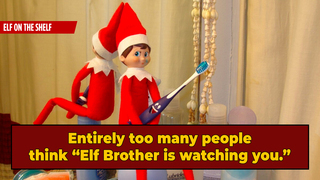The Bizarre 'Surveillance State' Outrage Over ... Elf On The Shelf

Nobody but your mom likes the Elf on the Shelf, but usually, there are normal reasons for the mild distaste. He looks a bit unsettling. Remembering to move him every night is a pain. You wouldn't think a doll that literally just sits there could garner actual outrage, but just about every year since about 2011, someone has written an article explaining that Santa's little helper is actually a tool of tyranny, preparing our children to accept the impending all-seeing gaze of Big Brother. Yes, really.
It started with a Washington Post article titled "CBS's 'Elf on the Shelf': Unwarranted Christmas surveillance techniques" that ties the Elf into the history of the upper classes turning Christmas from an occasion for the poor to get theirs into the "modernized morality of Dickens" and concludes "'The Elf on the Shelf' is just another nannycam in a nanny state obsessed with penal codes."
In 2012, the Atlantic frowned on the Elf "solicit the child's Christmas wishes -- for gifts, not for peace on earth or a cure for cancer," as if it's a doll's fault that your average grade-schooler can be a little self-centered, before asking "Why inject a note of fear and suspicion into a season and a holiday that are meant to be about love, togetherness, and forgiveness?" and warning against using the elf "to bully your child into thinking that good behavior equals gifts," having apparently forgotten that entire Santa thing.
Don't Miss
However, things really got going in 2014, with Dr. Laura Pinto's article for the Canadian Centre of Policy Alternatives and subsequent research into "'Elf on the Shelf' and the normalization of surveillance." She compares the doll to 18th-century prison models, cites fucking Foucault, and gave media outlets "slow news day" material for years to come. She told HLN the same year that "What we're hearing is that some parents are saying, 'That doll creeps me out, and I don't like it spying on us,'" because the Elf apparently became mandatory in Canada at some point, and clarified to the Washington Post that "It sounds humorous, but we argue that if a kid is okay with this bureaucratic elf spying on them in their home, it normalizes the idea of surveillance and in the future restrictions on our privacy might be more easily accepted," just in case anyone thought she was kidding.
It paved the way for a Guardian columnist to claim that "Elf on the Shelf is easily the most violently dreadful thing to happen in 2016" and "I would rather die than live under the harrowing surveillance-state gaze of Elf on the Shelf" and an article in The Week to argue in 2018 that Santa is okay because he "lacks the elf's suggestion of persistent, in-home surveillance on a mass scale," which "may seem an overreaction to a harmless Christmas toy -- and perhaps it would be, were the surveillance state not so insidious." Right up through last year, Vice was comparing the Elf on the Shelf to such modern horrors as tech platforms that allow teachers to communicate with parents. And an entirely different Guardian columnist almost made sense when he admitted, "I've no doubt plenty of parents will dismiss what I'm saying here as unnecessary scaremongering over something that's actually fine, fun, and basically a bit of stupid play at Christmas time," before plowing ahead into "the effects of surveillance." So close.
Top image: An Errant Knight/Wikimedia Commons